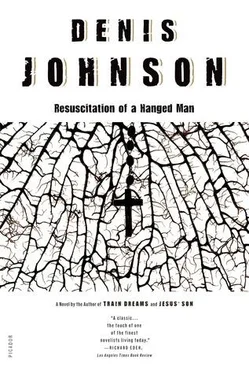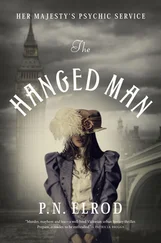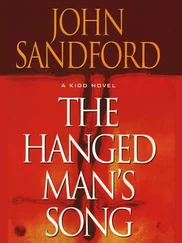How have I failed you? Always and everywhere I let you down. And you never let me down.
Give me another chance to betray you, Lord. Let me let you down again.
English took off his shirt and pants.
Nothing around here in the way of footwear would fit him. These, his own black no-nonsense Sears service shoes, marketed for the janitorial crowd, would have to do. He wished Leanna’s pantsuits weren’t so small — in a pantsuit and her brown fedora and this slash of lipstick and these false eyelashes, no one would know if he was a man dressed up as a woman or a woman dressed up as a man.
But it was going to have to be a skirt. This jungle cotton wraparound, with green, red, and yellow orchids flourishing on a black background, very tropical. The olive fedora set off the greens in the skirt. The black shoes were a match. The left eyelash fell off. One would do. And two bullets, he estimated, were enough to kill anybody whose time had come. He put the gun in his purse.
The important thing was to present a good front. But first you had to know how to fasten a bra behind your back. He settled for fastening it first and then pulling it over his shoulders, though this method twisted the straps. And then you had to have something in the cups.
I am going to stuff money in this bra, he announced to an audience of quivering albinos that had suddenly become his image of an all-seeing God. Back in the living room he tipped over the cash box and got on his knees and snatched at the bills on the floor. For my left breast tens and twenties, thirteen singles for my right.
None of the blouses would fit him. He had to tear the sleeves off his shirt and settle for that.
He walked downstairs and out the door and past the cabins and took several tentative steps along the sidewalk. A few people he couldn’t bring himself to look at passed him as he walked toward Commercial, but nobody said anything.
On Commercial Street all the shops were open, broadcasting tears and fragrances and songs delivering their knives, the aromas of spun candy and suntan oil and incense and perfume. He immersed himself in it all for ten seconds, made an alley not half a block east, and ducked into it. Three women passed him on roller skates, wearing headphones and holding hands.
Giving up his forward progress and seeking shelter in this alley had been a mistake. For a few seconds he didn’t think he was going any farther dressed like this. His imposture felt obvious. Anybody could see he was a woman who couldn’t even fasten a bra. But nobody was looking at him.
He stepped onto a street filled with people in short shorts and big roller skates and earphones, a street of headgear and desperation jammed with people walking their invisible dogs, exploding with people wearing huge blue velvet novelty hats. Not even a glance from these citizens. On this avenue he was just another case of the hot-and-lonelies, another attempter working on a firestorm. There were cops on extra corners today directing traffic. They never glanced at him. Cars nudged through the throng that covered the pavement from wall to wall, cars with their tapedecks blazing stereophonically as they passed, but for the most part it seemed to be a parade consisting of children who had to go to the bathroom now, and parents who wished to go in two different directions — like life — and young, electric, vividly sexual men staring at one another through a drugged haze and couples thinking about leaving one another because the sea’s erotic whisper was making them crazy. English could feel what they were thinking. And he could see plainly that this was the real and permanent Provincetown, the mad seaside hamlet that had been here since the day of his arrival, and it hadn’t been disguised or overlaid by the empty winter season, it had simply drained away into the corners, and the people had turned invisible because they, like Gerald Twinbrook, were ghosts. And they, as Twinbrook had, had now turned visible and fleshly again. But only he, Leonard English, was alive. These wraiths couldn’t see him.
He walked among them. He was getting used to this. Exhaust fumes on my pulse points, he thought.
The humanified forest. Nobody familiar around. Where are the people who knew me when I was knowable?
And then he encountered Berryman on the teeming street. Berryman, the drunken reporter English had shared two drinks with, and probably, when he thought about it, one of the very few people who knew him in this world. “Hey, hey, hey,” Berryman said. “Uh — Leonard English?”
Fuck you, he thought. I do not know you. So please stop addressing me and touching me.
“I can give you about three minutes,” he told Berryman. “I don’t want to be late for Mass.”
The reporter took him by the hand and pulled him close to a wall. “It’s good to see a friendly face,” he told English. “I’ve been away.”
English said nothing. Somehow Berryman, by ignoring his appearance, made him feel more uncomfortable than he might have done by shouting out loud about it.
“I just got back from New Hampshire,” Berryman said.
“Oh. I was there, too.”
“Not where I was. I was in Edge Hill.”
“Edge Hill?” English said.
“A treatment center. The paper’s insurance program covered it.”
“You mean — for booze?”
Berryman’s look was direct — not at all sheepish. “I lost the battle and won the war.”
For an awkward moment, English didn’t know what to say. Berryman scratched an arm, pinched his nose vigorously.
“I see you’re in costume today,” Berryman said at last.
“Forget you saw me.”
“I really don’t think I can do that.”
“Okay. I don’t care. Obviously I just say, Fuck it.”
Berryman seemed to be trying to glance down English’s bodice. “I’m familiar with that philosophy.”
English thought of reaching into his purse and taking out his.44. Giving everybody a little jolt.
“You look good,” Berryman said.
“Thanks. Your three minutes is up.”
“You look very, very eighties.”
“Thanks.”
“Take care, Lenny.”
“Forget my name,” English said.
To get to the church he had to double back to Bradford. He cut through the alley where the costumed roughs hung out around the A-House, a notorious leather bar, but nobody even whistled. He made himself out of breath going up the concrete flights cut into the embankment to Bradford. It was nearly ten o’clock of a Sunday morning, and that’s what had him hurrying; he wanted to get to the rectory before the priest was done; he wanted to make his confession.
English heard voices in the sitting room, and so he waited by the door. He’d been in this room on his first day in Provincetown, the day he’d met Leanna. He stepped back for the person coming out, a teenage girl who couldn’t have had anything very interesting to be ashamed of.
The priest, a young, angular man, was about to put on his garment for Mass. As English came in he stopped, and looked at his watch.
Dressed in these clothes and feeling beautiful, English sat down in the chair. “Bless me, Father,” he said, “for I have sinned.”
The priest set the garment aside and looked at English carefully, then at his watch again. “You’re my last confession,” he said.
He sat down next to English and put his slender fingers on the makeshift partition. “Do we need this?”
English shook his head. Father moved it aside.
“Call me,” English said, “May — June.”
“Ah well, I’m Father Michael.” Father put his elbows on his knees and his chin in his hands, and seemed to be thinking. “May — June. You are a transvestite?”
“Yes.”
“Doesn’t that confuse the issue of your sexuality somewhat?”
Читать дальше












